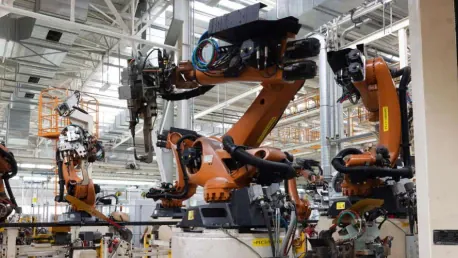In recent years, the automotive industry has been witnessing a transformative shift with the integration of robotics and automation, a trend that is significantly reshaping the landscape of automobile manufacturing and maintenance. Going back to the roots of industrial automation, we find the pioneering efforts of Ransom Eli Olds and Henry Ford, whose introduction of assembly lines in the early 1900s laid the foundation for modern mass vehicle production. The evolution from these initial innovations to today’s smart factory robots highlights the profound impact of technological advancements on the industry.
The primary advantage of automation in automobile manufacturing lies in its ability to enhance production efficiency. Industrial robots play an essential role in streamlining various processes, from ensuring consistent weld quality to achieving precise equipment installation and executing high-grade paint jobs. These robots adhere strictly to safety standards, contributing to a safer working environment. Contrary to the apprehensions that automation might result in job losses, the reality is that these technological advancements are more likely to transform career paths and skill sets within the industry rather than diminish employment opportunities. As robots take over repetitive and hazardous tasks, human workers can be trained for more complex and rewarding roles.
Automation’s influence extends beyond manufacturing into vehicle maintenance, where it has the potential to revolutionize services. Robotics can efficiently handle routine tasks such as tire replacements and diagnostic checks, tasks that are often monotonous and time-consuming. By developing repeatable maintenance methods, robotics can significantly reduce wait times, subsequently improving customer satisfaction and overall service quality. Moreover, advancements in artificial intelligence can provide valuable data insights, aiding in the identification of areas that require attention and the optimization of both production and maintenance processes.
Future Trends and Market Growth
The adoption of robotics and automation in the automotive industry is set to continue growing, driven by the constant pursuit of efficiency and innovation. As technology progresses, we can expect even more sophisticated robots, capable of performing complex tasks with higher precision and speed. Collaboration between human workers and robots will become increasingly seamless, with advancements in collaborative robotics, or cobots, enhancing productivity without compromising safety.
The market for automotive robotics is projected to expand, with significant investments being made in research and development to push the boundaries of what’s possible. Emerging trends such as the Internet of Things (IoT) and Industry 4.0 will further integrate smart technologies into manufacturing and maintenance operations, leading to smarter factories and more effective service centers. This ongoing evolution underscores the critical role that robotics and automation play in driving the future of the automotive industry.









